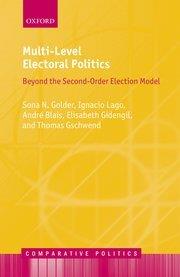Install the app
Install this application on your home screen for quick and easy access when you’re on the go.
Just tap then “Add to Home Screen”
Install this application on your home screen for quick and easy access when you’re on the go.
Just tap then “Add to Home Screen”
Install this application on your home screen for quick and easy access when you’re on the go.
Just tap then “Add to Home Screen”
 Multi-Level Electoral Politics: Beyond the Second-Order Election Model is written for political observers and researchers who are interested in elections because they care about representation, accountability, voting behaviour, or party strategies.
Multi-Level Electoral Politics: Beyond the Second-Order Election Model is written for political observers and researchers who are interested in elections because they care about representation, accountability, voting behaviour, or party strategies.
In democracies today, political power is dispersed across multiple levels of government, and citizens elect representatives to multiple electoral arenas. Political behaviour at one level is influenced by what happens at the other levels. Rather than focusing on a single level in isolation, or only on voters, this book explains how party and voter behaviour in a given election is affected by the existence of multiple electoral arenas for the selection of political office holders within the country.
The most influential framework for explaining multi-level electoral politics has been the second-order election model, where elections for national office are considered to be first-order elections and elections at other levels are second-order ones. Multi-Level Electoral Politics goes beyond this framework to show the micro mechanisms generating the aggregate patterns of voting behaviour originally described by scholars using a first-order election versus second-order election approach, and to reveal previously hidden variation within each electoral arena.
The theoretical argument addresses entry decisions by party elites, campaign strategies, and voter choices across the multiple electoral arenas, generating a variety of observable implications. Empirically, the book examines party strategy and vote choice at three levels of government – European, national, and subnational – in three well-established democracies, from 2011 to 2015: France, Germany, and Spain. This book is the first to examine multi-level politics across three levels, and it relies on both qualitative and quantitative data (eg survey data, content analysis of campaign materials, and interviews with campaign managers).
Multi-Level Electoral Politics shows how the incentives provided by multiple arenas affect political behaviour differently across parties and voters, and across regions and countries. Some of this variation is driven by electoral institutions. That is, both voters and parties take the permissiveness of the electoral system (as well as the possibility of entering a government cabinet) into account, leading to different choices and outcomes for small versus large parties. Party platforms, and the electoral arenas in which different policies are determined, also affect where parties place their resources and how voters react, both in evaluating policy outcomes and in attributing responsibility.
 The authors and the MEDW project
The authors and the MEDW projectThe authors are based in North America: André Blais at the Université de Montréal, Elisabeth Gidengil at McGill University, Sona Golder at Pennsylvania State University; and Europe: Thomas Gschwend at the University of Mannheim and Ignacio Lago at Universitat Pompeu Fabra, and all research political behaviour and institutions.
Multi-Level Electoral Politics is part of the larger Making Electoral Democracy Work (MEDW) project, an international collaborative project designed to investigate the impact of electoral rules on the functioning of democracy. The MEDW project was funded by the Social Sciences and Humanities Research Council of Canada; this book also benefited from financial support from the Spanish Ministry of Economy and Competitiveness.
The larger MEDW project produced the data used in this book, and includes similar data on additional countries as well, particularly Canada and Switzerland. The data, which are freely available for any interested party, include multiple surveys over different electoral arenas and types of elections in multiple countries, as well as data from interviews and experiments on electoral and party behaviour.
The MEDW team encourages researchers to make use of this data, and to contribute to the study of how electoral democracy does – and could – work.
Keywords: Elections